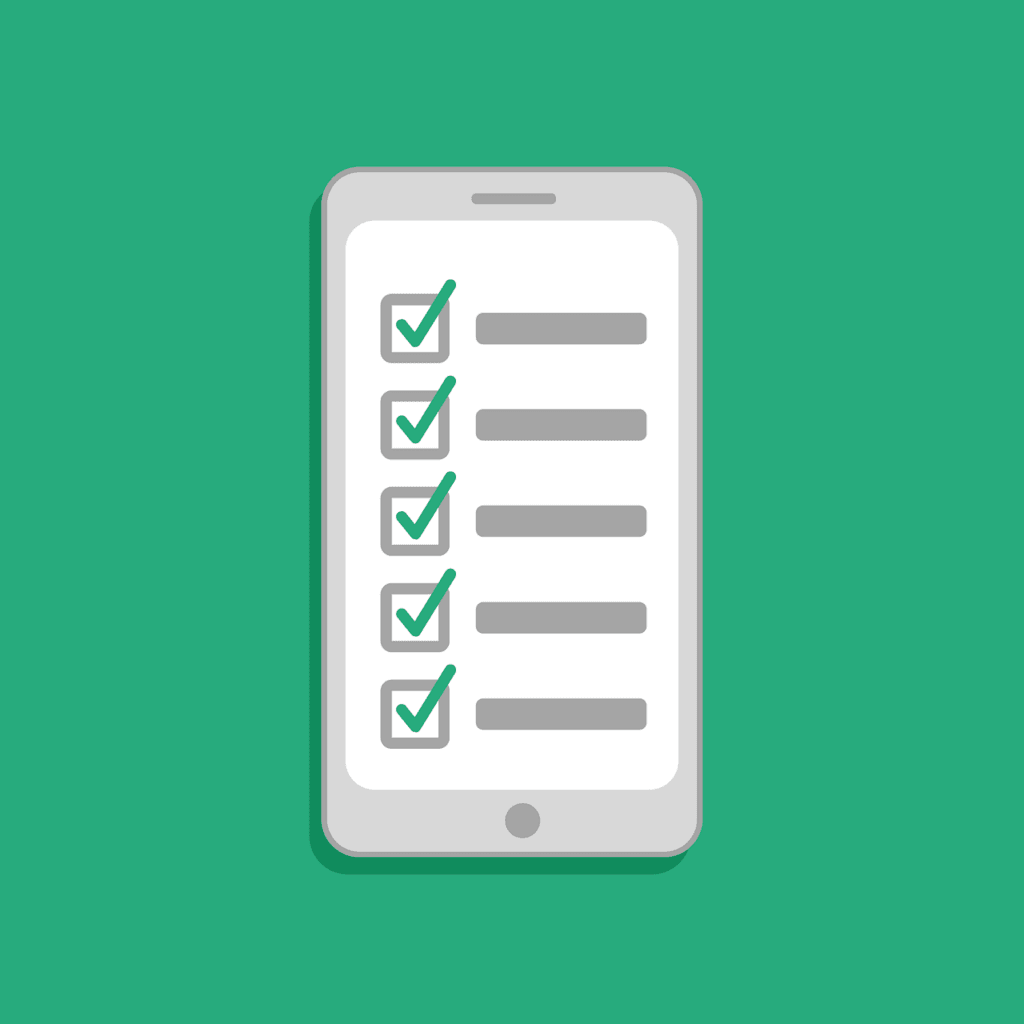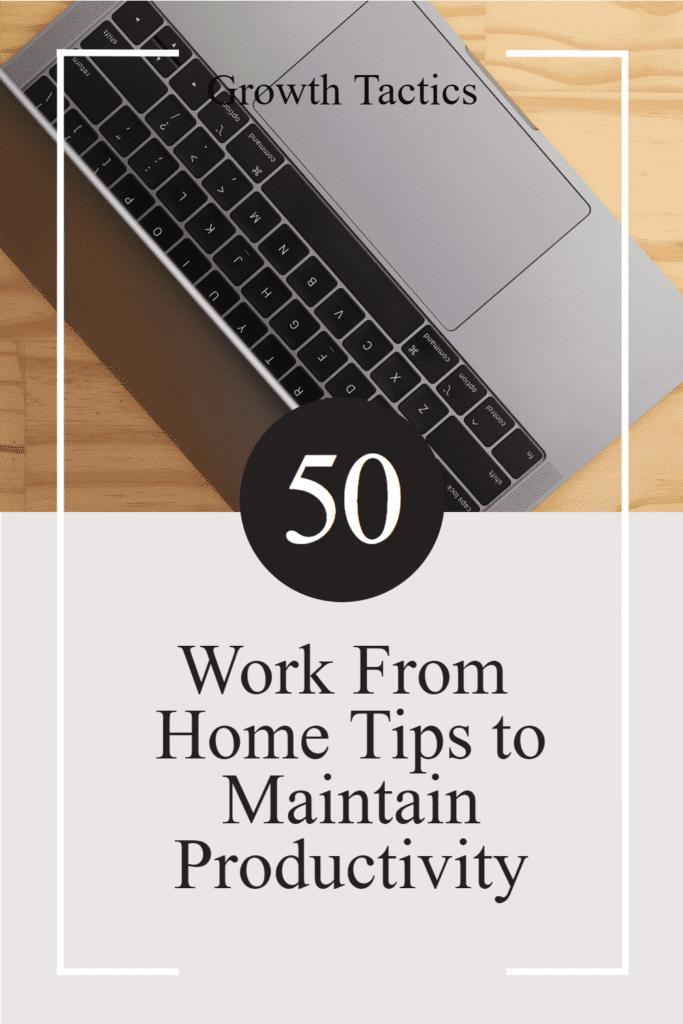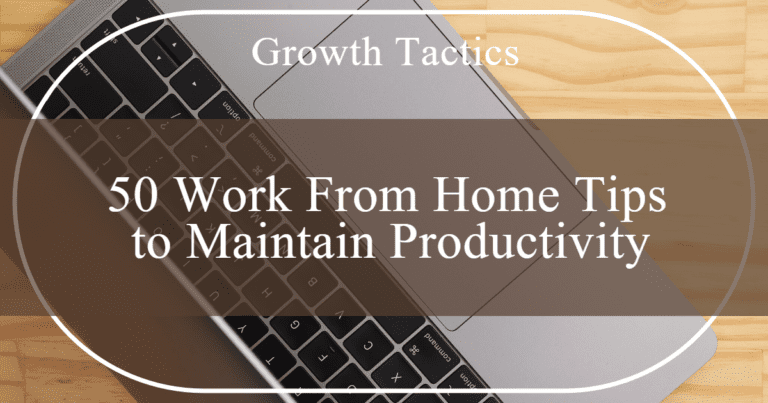Working from home offers flexibility and convenience but also requires a specific set of skills and disciplines to remain productive. With experience both in working from home personally and managing teams in a remote setting, I’ve gathered valuable insights into what makes a home office function efficiently.
In this guide, I will share 50 tips for working remotely that have enhanced my productivity and could help you optimize your workflow while working from home. These strategies are designed to help you maintain focus, structure your day effectively, and create a positive work environment in your own space.

1. Create a Dedicated Workspace
Set up a home office or a specific space in your home for work. This helps separate your work and home life and keeps distractions at bay.
A dedicated workspace allows you to focus on your tasks and maintain a professional mindset while working from home.

2. Set Work Hours
Establish a work schedule and stick to it. This will help you maintain a work-life balance and ensure you’re working effectively during your designated work hours.
Consistent work hours also make it easier for your colleagues to know when you’re available for communication and collaboration.

3. Take Breaks
Regular breaks are essential for maintaining productivity. Step away from your workspace and take short breaks throughout the day to recharge.
This can help reduce stress, prevent burnout, and improve your overall well-being.

4. Stay Organized
Keep your workspace tidy and organized. This will help you stay focused and on top of your tasks.
Organize your files, documents, and supplies to create a clutter-free environment that promotes productivity.

5. Minimize Distractions
Identify potential distractions in your home and find ways to eliminate them. This may include turning off the TV, using noise-canceling headphones, or setting boundaries with family members.
By minimizing distractions, you can maintain your focus and work more efficiently.

6. Set Goals
Establish daily and weekly goals to help you stay on track and measure your performance at work.
Setting goals can provide motivation, direction, and a sense of accomplishment as you complete tasks and make progress on projects.

7. Prioritize Tasks
Focus on high-priority tasks first and work your way down the list. This will help you stay productive and ensure you’re making progress on essential projects.
Prioritizing tasks can also help you manage your time more effectively and reduce stress.

8. Use Technology
Utilize video conferencing and other communication tools to stay connected with your team and collaborate effectively.
Embrace technology to streamline your workflow, stay organized, and maintain a sense of camaraderie with your colleagues.

9. Stay Connected
Regularly communicate with your colleagues through video calls, emails, and instant messaging. This helps maintain a sense of work culture and keeps you engaged with your team.
Staying connected can also provide opportunities for brainstorming, problem-solving, and social interaction.

10. Dress for Success
Even though you’re working from home, getting dressed as if you’re going to the office can help you feel more professional and focused.
Dressing for success can improve your mindset, boost your confidence, and enhance your productivity.

11. Exercise
Incorporate physical activity into your daily routine to boost your energy levels and overall well-being.
Regular exercise can improve your mood, reduce stress, and increase your productivity while working from home.

12. Eat Healthily
Maintain a balanced diet and avoid excessive snacking to stay energized and focused throughout the day.
Eating nutritious meals can help fuel your body and mind, enabling you to perform at your best during your work hours.

13. Establish Boundaries
Set clear boundaries between your work and personal life to maintain a healthy work-life balance.
Communicate your work schedule to your family and friends, and designate specific times for work and personal activities to avoid burnout and maintain overall well-being.

14. Use a Timer
Utilize a timer or productivity app to track how much time you spend on tasks and help you stay focused.
Techniques like the Pomodoro Technique can improve your time management skills and enhance your productivity by breaking your work into manageable intervals.
15. Stay Flexible
Be open to adjusting your work schedule and priorities as needed to accommodate changes in your personal life or work environment.
Embrace flexibility to maintain a healthy work-life balance and adapt to new challenges or opportunities that may arise.

16. Get Outside
Take breaks outside or work near a window to get some fresh air and natural light, which can help boost your mood and productivity.
Exposure to natural light can improve your mental health, increase your focus, and reduce eye strain from staring at screens.
17. Stay Accountable
Share your goals and progress with a colleague or friend to help you stay accountable and motivated.
Regular check-ins can provide encouragement, support, and constructive feedback, helping you stay on track and achieve your objectives.

18. Celebrate Successes
Acknowledge your achievements and celebrate small wins to stay motivated and maintain a positive outlook.
Recognizing your accomplishments can boost your self-esteem, improve job satisfaction, and inspire you to continue working towards your goals.
19. Ask for Help
Don’t hesitate to reach out to your colleagues or manager for support when needed.
Asking for help can provide valuable insights, foster collaboration, and strengthen your professional relationships, ultimately benefiting your productivity and career growth.
20. Stay Updated
Keep up with industry news and trends to stay informed and maintain a competitive edge.
Staying current in your field can help you identify new opportunities, develop relevant skills, and contribute valuable ideas to your team and organization.
21. Invest in Home Office Equipment
Ensure you have the necessary tools and equipment to work efficiently, such as a comfortable chair, desk, and reliable internet connection.
Investing in quality home office equipment can improve your comfort, reduce strain, and enhance your overall productivity while working from home.
22. Find Your Peak Productivity Times
Identify when you’re most productive and schedule your most critical tasks during those times.
By understanding your natural energy rhythms, you can optimize your work schedule to maximize your efficiency and make the most of your productive periods.

23. Embrace Remote Work
Recognize the benefits of working from home and use them to your advantage, such as the flexibility to build your work schedule around your personal life.
Embracing remote work can lead to improved work-life balance, reduced stress, and increased job satisfaction.
24. Stay Positive
Maintain a positive attitude and focus on the advantages of working from home, such as the lack of commute and the ability to create a personalized work environment.
Staying positive can help you overcome challenges, boost your motivation, and enhance your overall well-being.
25. Know When to Disconnect
Set boundaries for when it’s time to put work away and focus on your personal life. This helps maintain a healthy work-life balance and prevents burnout.
Knowing when to disconnect allows you to recharge and return to work with renewed energy and focus.

26. Create a Morning Routine
Establish a routine to help you transition from home life to work mode, such as exercising, showering, or having breakfast.
A consistent morning routine can set the tone for your day, improve your mindset, and help you approach your work with a sense of purpose and motivation.
27. Use Productivity Techniques
Implement productivity strategies like the Pomodoro Technique or time blocking to stay focused and manage your time effectively. These techniques can help you break tasks into manageable chunks, reduce distractions, and maintain momentum throughout your workday.
28. Avoid Multitasking
Focus on one task at a time to improve your concentration and productivity. Multitasking can lead to decreased efficiency, increased stress, and lower-quality work.
By concentrating on a single task, you can complete it more effectively and move on to the next with a sense of accomplishment.

29. Set Boundaries with Family and Pets
Communicate with your family members and establish rules to minimize interruptions during your work hours.
Clear boundaries can help you maintain focus and productivity while working from home, while also ensuring that your loved ones understand and respect your work needs.
30. Customize Your Workspace
Personalize your home office with items that inspire and motivate you, such as plants, artwork, or ergonomic furniture.
A customized workspace can boost your creativity, improve your mood, and create a comfortable environment that supports your productivity and well-being.
31. Utilize Project Management Tools
Use tools like Trello, Asana, or Basecamp to organize your tasks, collaborate with your team, and track your progress.
Project management tools can streamline your workflow, improve communication, and help you stay on top of deadlines and priorities.

32. Stay Hydrated
Keep a water bottle at your desk to remind you to drink water throughout the day and stay hydrated.
Staying hydrated can improve your concentration, prevent fatigue, and support overall health and well-being while working from home.
33. Learn New Skills
Use your breaks or free time to learn new skills that can enhance your performance at work or support your personal growth.
Continuous learning can help you stay competitive in your industry, boost your confidence, and increase your job satisfaction.
34. Network Virtually
Attend virtual conferences, webinars, or networking events to stay connected with your industry and expand your professional network.
Virtual networking can help you maintain relationships, discover new opportunities, and stay informed about trends and developments in your field.

35. Plan Your Day
Create a daily to-do list or schedule to help you prioritize tasks and stay organized.
Planning your day can increase your productivity, reduce stress, and ensure that you allocate sufficient time and energy to your most important tasks.
36. Listen to Music
Play background music or white noise to help you focus and create a productive work environment.
Listening to music can boost your mood, increase your concentration, and provide a pleasant atmosphere while working from home.
37. Practice Self-Care
Take time for yourself to relax, meditate, or engage in hobbies outside of work to maintain your mental and emotional well-being.
Practicing self-care can help you manage stress, prevent burnout, and maintain a healthy work-life balance.

38. Reward Yourself
Treat yourself to something enjoyable after completing a challenging task or reaching a milestone, such as a special snack or a short break.
Rewards can boost your motivation, reinforce positive habits, and provide a sense of accomplishment.
39. Check in with Your Manager
Regularly communicate with your manager to discuss your progress, address any concerns, and receive feedback.
Open and consistent communication can strengthen your working relationship, provide valuable guidance, and help you stay aligned with your team’s goals and expectations.
40. Set up a Second Screen
Use a second monitor, laptop, or tablet to increase your workspace and improve your efficiency.
A second screen can enhance your productivity by allowing you to view multiple documents or applications simultaneously, reducing the need to switch between windows or tabs.

41. Use Keyboard Shortcuts
Learn and use keyboard shortcuts to save time and increase your productivity.
Mastering keyboard shortcuts can help you navigate through applications and complete tasks more efficiently, reducing the need for repetitive mouse clicks and menu selections.
42. Optimize Your Internet Connection
Upgrade your internet plan, use a wired connection, or invest in a Wi-Fi extender to ensure a stable and fast internet connection.
A reliable and high-speed internet connection is essential for remote work, enabling smooth communication with your team and reducing the frustration of slow-loading applications and websites.
43. Declutter Your Digital Workspace
Organize your files and folders, clean up your desktop, and delete unnecessary files to maintain a clutter-free digital environment.
A well-organized digital workspace can improve your focus, reduce distractions, and make it easier to locate important documents and resources.

44. Use Blue-Light-Blocking Glasses
Wear blue-light-blocking glasses to reduce eye strain and improve your sleep quality.
These glasses can help minimize the harmful effects of blue light emitted from computer screens, smartphones, and other digital devices, promoting better eye health and sleep patterns.
45. Stay Active During Breaks
Engage in light physical activities during your breaks, such as stretching, walking, or doing yoga.
Staying active throughout the day can help you maintain your physical health, reduce stress, and boost your energy levels, leading to enhanced productivity and well-being.
46. Create an End-of-Day Routine
Establish a routine to help you wind down and transition from work to home life, such as tidying up your workspace or reviewing your accomplishments for the day.
An end-of-day routine can provide a sense of closure, allowing you to mentally disconnect from work and fully engage in your personal life.

47. Use a Standing Desk
Alternate between sitting and standing throughout the day to reduce the negative effects of prolonged sitting.
Using a standing desk can improve your posture, increase your energy levels, and promote better overall health while working from home.
48. Limit Social Media
Set specific times for checking social media and avoid using it during your work hours to stay focused.
Limiting social media usage can help you minimize distractions, maintain your concentration, and ensure that you devote your full attention to your work tasks.

49. Use Noise-Canceling Headphones
Invest in noise-canceling headphones to block out distractions and create a quiet work environment.
These headphones can help you maintain focus, especially in noisy or busy home settings, enabling you to work more efficiently and effectively.
50. Practice Gratitude
Take a few moments each day to reflect on the positive aspects of your life and express gratitude for the opportunity to work from home.
Practicing gratitude can improve your mood, increase your job satisfaction, and promote a positive outlook, making it easier to navigate the challenges of remote work.
By following these tips, you can stay productive while working from home and make the most of your remote work arrangement.
Did you enjoy these tips for working remotely? Please don’t forget to share and subscribe.


